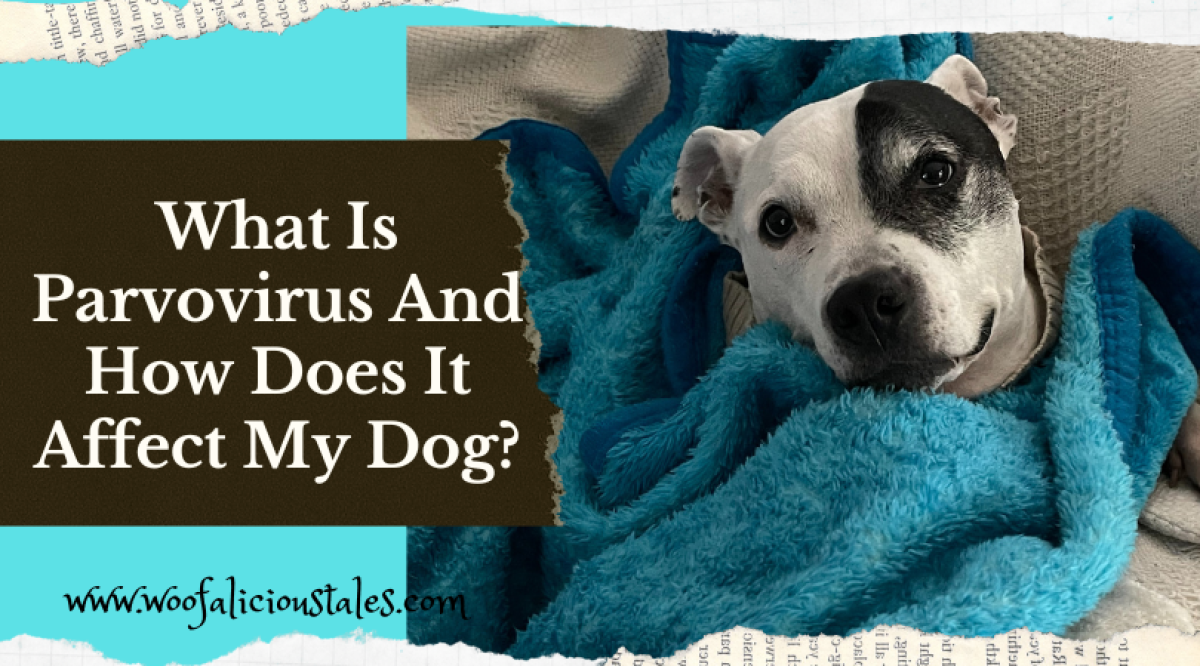What Is Parvovirus And How Does It Affect My Dog?

It’s been known for a little while now that some dogs in our local area have caught Canine Parvovirus, aka CPV.
Our local Animal Care Facility had to close it’s doors for a while because apparently it was found there.
This seems to have sent a bit of panic through some dog owners.
I totally get this!
HOWEVER, if you’re a responsible dog owner and have vaccinated your dog against Canine Parvovirus then your dog is fine.
Years ago when Henry and Isabel were alive and had their first litter our next door neighbour informed us that their young dog had passed of Canine Parvovirus.
They said their Vet advised them to notify the neighbours that the virus was in the area.
I was saddened and surprised their dog had died and asked whether it had been vaccinated against the virus! To which they replied no.
I confidently announced that both Henry and Isabel were vaccinated against it as were all their puppies.
And none of them ever contracted the virus, even though it is said to live in the ground for roughly 7-9 years.
I’m bringing this up because it has been found in our local area.
WHAT EXACTLY IS CANINE PARVOVIRUS?
According to PetMD – Canine parvovirus (CPV or commonly referred to as “parvo”) is one of the most serious viruses that dogs can get and is very preventable with proper vaccination.
CPV was discovered in the 1970s and rapidly became a serious threat to canine health.
This is primarily because the virus is hard to kill, can live for a long time in the environment, is shed in large quantities by infected dogs, is highly contagious, and is often fatal without appropriate treatment.
This is why the parvo vaccine is considered a core vaccine in dogs and cats.
While the highly effective parvovirus vaccine has decreased the risk to properly vaccinated dogs, this disease is still widely prevalent, especially in puppies and poorly-vaccinated adolescent dogs.
Parvo is an infectious DNA virus that commonly causes severe illness in young and unvaccinated dogs.
It primarily affects the body’s rapidly dividing cells, meaning the intestinal tract and bone marrow are the most affected.
Heart muscle cells of very young puppies can also be damaged by parvovirus.
Although parvovirus is most common in puppies and adolescent dogs, it can also affect adult or senior dogs, especially if they are unvaccinated.
HOW CAN MY DOG GET CANINE PARVOVIRUS ?
According to PetMD – Parvovirus is an incredibly contagious disease that spreads quickly and efficiently.
While canine parvovirus is not airborne, it can be found on many surfaces.
Parvo is spread by contact with contaminated feces, aka poop, but you don’t have to see feces for the virus to be present.
It can live on the ground, in kennels, on peoples’ hands, on objects, or on the clothing of those who have been contaminated.
Dogs can also carry it on their fur or paws if they’ve come in contact with contaminated material.
Parvovirus can survive in a dog’s environment for months, if not years.
I would suggest not letting your dog near other dogs poop!
Don’t let them eat it or sniff it.
If you happen to walk in other dogs poop, thoroughly clean it off your shoes.
HOW CAN CANINE PARVOVIRUS AFFECT MY DOG?
According to PetMD – When the virus infects the bone marrow, it attacks the young immune cells, which leads a drop in protective white blood cells.
This weakens the body’s ability to protect itself and allows the virus to invade the gastrointestinal (GI) tract more easily.
This is where the worst damage happens. The virus attacks the lining of the small intestine, which prevents the dog’s GI tract from being able to:
- Absorb nutrients
- Prevent fluid loss into the stool
- Stop bacteria from moving into the gut wall and then into the bloodstream
This leads to serious health issues, such as:
While parvo in dogs is not always fatal, those that do not survive typically die from dehydration or shock—along with the damage caused by the septic toxins from the intestinal bacteria escaping into the bloodstream.
HOW DO I PREVENT MY DOG FROM GETTING CANINE PARVOVIRUS?
According to PetMD – The canine parvovirus vaccine is most often given in a combination vaccine that goes by a variety of acronyms: DHPP, DAPP, DA2PP, DHLPP, etc.
This vaccine is considered a core vaccine and should be given every three to four weeks from six to eight weeks to 16–20 weeks of age.
The most important thing for preventing parvo is making sure you get your puppy in on time for their vaccines.
Puppies should only socialize with fully vaccinated dogs until they are able to be fully vaccinated themselves. Areas where your puppy can come into contact with unvaccinated dogs, such as dog parks, should be avoided.
A dog will need to receive a booster vaccine at 1 year of age to be considered fully vaccinated. Dogs should also continue to receive vaccines every one to three years for life or have their immunity monitored using parvovirus antibody tests.
WHAT DO I DO IF I THINK MY DOG MIGHT HAVE CANINE PARVOVIRUS?
DO NOT HEISTATE – Take your dog straight to your trusted Veterinarian!
For more information on Canine Parvovirus – click here PetMD!
If you type Canine Parvovirus into your search engine much more information will arise.
This post is to bring your attention to it.
Is Billy vaccinated against Parvo virus – ABSOLUTELY!
If you are unsure as to whether or not your dog is vaccinated against it – check with your trusted Veterinarian.
WHAT DOES ALL THIS MEAN?
Canine Parvovirus aka Parvo is a deadly disease to young and unvaccinated dogs.
It’s important for you to know what it is, how your dog can get it and what you can do for your dog to prevent them from getting it.
IN THE COMMENTS BELOW – BILLY WOULD LIKE TO KNOW – IF YOUR DOG IS VACCINATED AGAINST PARVO VIRUS?



Leave A Comment